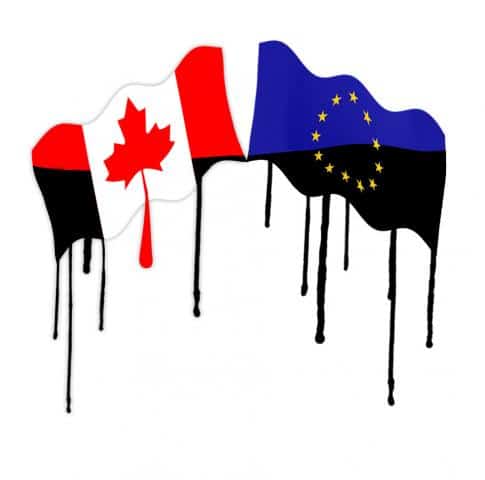Canada does not – as yet – export much tar sands oil to Europe. So why, you might ask, have the Canadian and Alberta governments been working overtime using tax dollars to fund a massive misinformation and lobbying campaign on the other side of the Atlantic?
There’s a clue in this press release from January announcing Alberta Energy Minister Ron Liepert’s $40,000 lobbying jaunts to the US and Europe: “The European Union is not currently a major market for Alberta’s oil sands products, but any legislation or tariffs adopted by the union’s government can serve as a model for individual nations around the world. We want to continue to share our story with the legislators so they have the facts about our clean energy strategies”
(I’ll let the “clean energy strategies” rubbish slide for now.)
It’s not about protecting existing markets. At the moment the vast majority of exported tar sands oil goes to the US. For the most part, it’s not even about securing a regulatory environment in Europe that protects future potential markets (although that is no doubt a contributing factor). I’ll tell you why the Canadian and Albertan governments are so worried that they’ve been applying pressure on European legislators to a degree at least one EU parliamentarian has declared “unacceptable”.
It’s about precedent. And they’re scared.
The EU is on the verge of what will effectively amount to a ban on tar sands oil. This will have very little impact on Europe’s oil supplies, but will set a global precedent, sending a huge message to the rest of the world that Canada’s tar sands are producing a product that is too dirty, unethical, unwanted, and unneeded. This is what Suncor, BP, TransCanada, and their extremely close friends in the Canadian government are most concerned about.
Here’s what Liepert had to say when asked by the Globe and Mail to comment on the EU developments:
Actually I couldn’t agree more.
Scientific research published last month backs up the EU’s proposal that tar sands oil be assigned an emissions value of 107 grams per megajoule, a measure of how much global warming gas is produced for each unit of energy you get when the fuel is burned. That’s far greater than conventional crude oil’s 87 grams per megajoule.
The reason for this difference is no secret. Huge amounts of heat are needed to extract bitumen from the sand, increasing the total emissions from tar sands oil far beyond just what’s released when the refined fuel is eventually burned. At issue is whether or not the EU’s Fuel Quality Directive will recognise this, and specify appropriately higher emissions figures for tar sands oil than conventional crude.
The EU is trying to base their decision on science. Canada is trying to arm-twist them into basing it on what’s most politically expedient for the billion dollar companies strip-mining Alberta.
It was looking like Canada’s bullying and misinformation campaign on behalf of the tar sands mega-corporations might be working until last week when the EU’s Climate Change Commissioner Connie Hedegaard announced her intention to push ahead with targeting tar sands and shale oil as high-carbon fuels.
The directive wouldn’t actually prohibit countries from importing tar sands oil, but by simply labeling it accurately as a high-carbon fuel, EU commitments to reduce emissions would effectively make it economically unviable to import, shutting the tar sands out of European markets.
But remember this was never primarily about European markets. The real reason for Canada’s desperate lobbying efforts is much closer to home.
Pressure is mounting on US legislators to put in place similar low-carbon fuel regulations, and opposition to TransCanada’s proposed Keystone XL pipeline that would pump tar sands oil to Texas refineries and the Enbridge Northern Gateway pipeline that would take tar sands crude west to Asian markets continues to grow.
A precendent set now by the European Union would make it far more politically feasible for the United States to follow suit, and might just be enough to tip the balance permanently against Canada’s dirty tar sands oil.
Image: UK Tar Sands Network
Subscribe to our newsletter
Stay up to date with DeSmog news and alerts






